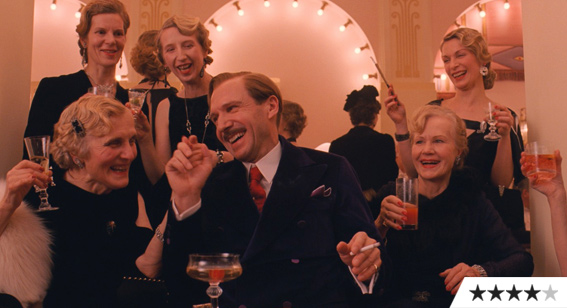Review: The Grand Budapest Hotel

Set to be Wes Anderson’s highest-earning film, The Grand Budapest Hotel follows on the heels of the also successful Moonrise Kingdom in matching his now-familiar odd-bod aesthetic with a mainstream audience. But where Moonrise was awash with wistful nostalgia in its take on adolescence, romance and scouting, Anderson’s latest mines its period setting in service of a broadly comical tale which enjoys frequent diversions into both black and off-colour humour even as a body count amasses and the Second World War threatens to intrude on the borders of the titular hotel’s fictitious homeland.
The cast list deceptively points to another sprawling ensemble effort, but despite the bountiful number of familiar faces on display and the amount of wandering in time and aspect ratio the film does, its arguably the most fixed around an individual performance of any Anderson pic since Rushmore. In a rare comic lead performance, Ralph Fiennes throws himself into a character that, thanks to Anderson’s screenplay, frequently offers unexpected laughs. As Mr Gustave – hotel concierge, elderly guests’ “companion”, perfume enthusiast and over-user of the word “darling” – Fiennes makes full use of the character’s ambiguity in class, legality, manners and sexuality, aided by whip-smart dialogue and a welcome eagerness to ham things up when required.
Unmistakably Anderson in style and tone, complete with some hilarious The Fantastic Mr Fox-sque moments, it’s satisfying to see this level of craftsmanship applied to a film that is often so silly it’s a pure delight to watch. Though as time catches up with Mr. Gustave and his hotel, it’d seem that there is a larger vein of bittersweet nostalgia lurking than you’d detect during Grand Budapest’s many side-splitting moments…
‘The Grand Budapest Hotel’ Movie Times
















